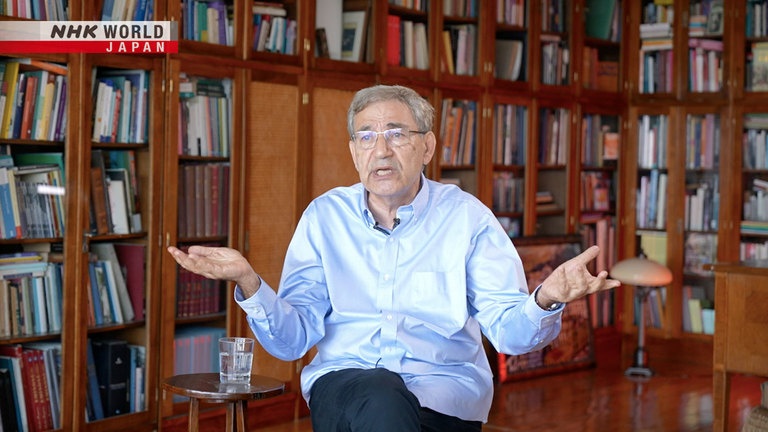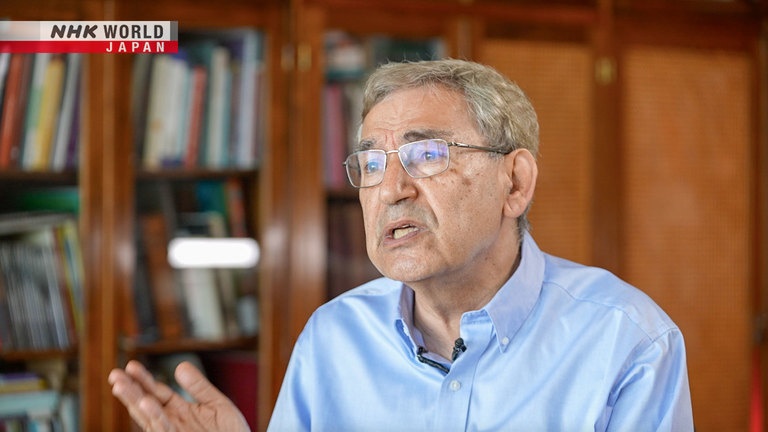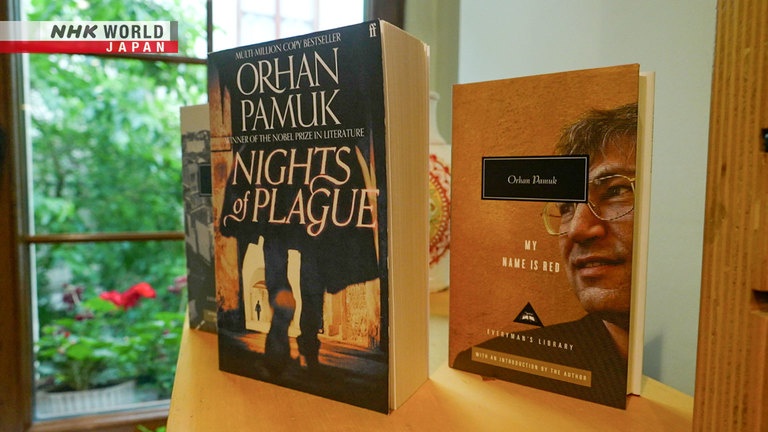The Power of the Pen at Times of Despair: Orhan Pamuk / Writer
Turkish Nobel Laureate Orhan Pamuk says the havoc caused by the 2023 Turkey-Syria earthquake is related to Turkey's culture and national traits, and he explains his belief in "the power of the pen."



Transcript
Direct Talk
On February the 6th, 2023,
a massive 7.8-magnitude earthquake
struck southeastern Turkey and Syria.
In Turkey, the death toll was more than 50,000.
Many lives were lost because buildings
did not meet earthquake-resistance standards,
and initial rescue efforts
were delayed in some areas.
Orhan Pamuk
was the first Turkish recipient
of the Nobel Prize in Literature.
He says the recent earthquake
made him extremely angry.
Immediately after the quake,
he wrote in a major American media outlet
that the Turkish people had been
"abandoned" and were "in despair."
The ugly, dramatical tragedy was this:
they were not around.
The government is slow,
incapacity of various
Turkish institutions.
People were dying and shooting themselves.
The people of Turkey faced
a dreadful disaster and despair.
We asked Pamuk how a writer can respond.
The Power of the Pen at Times of Despair
Born in Istanbul in 1952,
Pamuk decided to become a novelist
at the age of 23,
and he began writing.
"My Name is Red,"
his historical mystery about painters
struggling between Western and
traditional Islamic techniques,
has won numerous
international awards and accolades.
In 2006,
Pamuk was awarded
the Nobel Prize in Literature
for his avant-garde style of
depicting the problems of westernization
in Turkey and his hometown Istanbul.
Translated into 63 languages,
including English and Japanese,
his books have been published
around the world.
Where was Pamuk
and how did he feel
when the 2023 Turkey–Syria earthquake struck?
I was in Istanbul
and this horrible earthquake,
it was so far away,
more than 1,000 kilometers away,
and it was not felt from Istanbul.
I learned it early in the morning.
At first, I did not understand its gravitas,
that it was a real horror.
Then, when I started to learn more about it,
I was for 36 hours glued
to internet and to Twitter.
I think humanity, in fact,
people in horrible conditions,
communicated through Twitter,
through internet, through mobile phones,
in very extremely interesting and new ways.
I was following many, many, many people
who were shooting themselves
inside the debris,
inside their apartment buildings
in horrific way.
Because at that time,
their mobiles had still some electricity
and was airing them with two purposes,
expressing themselves that they are alive
and they want to be saved,
but also expressing a very,
very damaging, dramatical,
damning anger that they wanted to be saved.
It seemed like a monstrous event,
out of hell,
and people were continuously,
all these videos were accompanied by
shouting of, "Allah! Allah!"
Everyone was shouting like that, "Allah!"
Telephones in that period, in those
first six, ten hours of the earthquake,
the earthquake was
in the middle of the night,
especially early in the morning,
was both a sort of a signaling instrument
for saving your life
and also, secondly, expressing yourself,
just like a pen, with anger.
Nobody has come to help us here, nobody at all.
In Turkey, immediately after the earthquake,
social networking sites were
flooded by posts from the victims.
On February the 11th,
five days after the earthquake,
Pamuk contributed a 'guest essay'
to the New York Times
focusing on those posted videos.
The title was
"A Girl Trapped Under Fallen Concrete.
A Man Unsure of What to Do."
It described a man feeling at a complete loss
as he films with his smartphone
a girl trapped in a collapsed building
who seems resigned to die.
Pamuk wrote:
"They are sending out two messages...
The first is the staggering scale
of the catastrophe.
The second is the feeling of
abandonment and despair...
that is as harrowing
as the earthquake itself."
The Turkish administration
of President Erdogan
reportedly lagged far behind
in its response to the earthquake,
and many pointed out that it was a
"man-made" rather than a "natural disaster."
I think Turkish people felt abandoned
after the earthquake because
the incapacity,
inadequacy,
ham-fistedness of the government was obvious.
People died
inside the cold beton,
because there was no help.
Especially in the first two days
of the earthquake,
Turkish government was so clumsy,
so ham-fisted,
so inadequate that
it was a sort of that
they were announcing their deaths.
The first week was scandalous.
Everyone was angry to the government
and the government did not appear on the TV.
They did not say, "Oh, I'm sorry,"
they just disappeared,
did not also announce,
and did not say, "We apologize."
But Pamuk says that the extensive damage
was not only the government's responsibility.
Almost 25 years ago, in 1999,
Turkey was hit by a massive earthquake
that caused many deaths.
1999
Based on that experience,
earthquake-resistance standards
were greatly strengthened,
and laws required for earthquake
preparedness were developed.
But, in reality,
it remained possible to register buildings
that didn't meet
earthquake-resistance standards
by paying a prescribed amount of money
to the authorities.
Illegal construction and renovation projects
were reportedly rampant
even among private citizens.
Although many building contractors
have been arrested,
Pamuk points out that Turkish national traits
are also to blame for the collapse
of many buildings this time.
25 years ago,
another earthquake,
this quality had happened,
and we did not,
the nation did not get a lesson.
In February, everyone was depressed about
the earthquake and regulations were imposed,
and there was an aura, an atmosphere
of this will not happen again.
But four months passed, it is already
mellowing down and getting forgotten.
It is partly the government to blame
or the constructors to blame,
but also, the culture, unfortunately,
should be blamed too.
People who are responsible,
people who are doing buildings
that do not satisfy
the scientific earthquake regulations
should, of course,
be held responsible and be punished.
But believe me, I'm a writer of Turkey.
I know my nation.
The nation also promotes and enjoys
not only bureaucracy and the government,
but we have a culture of breaking,
not caring about regulations.
We have, unfortunately,
a culture of what the Westerners,
in an Orientalist way, call fatalism.
Unfortunately, there is also
that kind of not caring about
irrational, unscientific fatalism.
Also, the desire to make a lot of money
by big constructors
and the desire of these buyers
who are giving immense money
to apartments that the constructors make,
they do not check, they do not care,
they do not think.
No one checks.
It is a culture.
Look, in Turkey,
all the regulations are perfect.
That if they impose and obey the regulations,
that earthquake is nothing to be afraid of.
The solution is that the Turkish people
should not give bribes to the clerks,
and the government clerks,
municipality clerks
should not get bribes from the people.
That's the solution.
Pamuk is also known for speaking out
about social issues in Turkey.
He has a profile as a writer
who criticizes the power of the state.
In the past, he has been accused of
insulting the state
by referring to the issue of massacres
during the Ottoman Empire,
which is considered a taboo subject in Turkey
So what is the power of the pen
in the face of a calamity
such as a major earthquake?
Literature has some power.
And for us,
the greatest value is free speech.
It should be defended.
Especially journalistic
free speech is important.
Writers, not all writers, some writers,
famous writers, efficient writers,
have some power.
I criticize the government
and I do my criticism mostly in interviews
or writings or journalistic writings.
I take risks.
There are more brave people in Turkey
who take more grave risks,
but this is what we can all do.
In the end, I do my best
to help the pain of the nation.
Unfortunately, or fortunately,
because I am famous,
I feel an obligation
to make political remarks.
But on the other hand,
politics is not my style.
It's not something I like.
But I do this because I'm angry,
because of my dignity.
When such a horrible thing is happening
after the earthquake
and the government is not doing,
you feel an anger.
You want to say something
and show it to the whole world.
But literature's truth is
not the journalistic truth.
I am internationally known as a sort of
a diplomat of critical voice of Turkey
but do not exaggerate things.
In the end, my duty, I always believe,
is to write good novels.
Sometimes, people do not want to
read about earthquakes.
Sometimes, people do not
enjoy my horrible stories,
or sometimes find them too sweet to talk.
I think it was French writer Stendhal,
the writer of "The Red and the Black,"
who said at the end of that book is that
literature is a mirror put on societies.
Literature has power.
In the end, literature can show you
things that you don't want to see.
If people want to run away from the truth,
you show them the truth.
Finally, we asked Pamuk to tell us the words
which provide him with support.
This is the first line of my novel,
"The New Life."
It means,
"One day I read a book
and it changed my whole life."
My novels, in the end,
are not written to represent a nation
but look at single individuals.
Literature is not there
to serve people's emotions.
It has its autonomy.
I write my books not to give
a consoling voice to people.
I am not some kind of an alcohol or a drug
that people will enjoy
to forget their troubles.
I am also writing my books
for my pleasure, for their autonomy,
for a sort of a standard of beauty that
I deeply believed for the last 50 years.
I am not writing my books as a social person
who always rushes and
volunteers to solve problems.
I am not a journalist.
What I defend is free speech
and also my right to write my novels,
even sometimes what the people,
what the nation thinks.
One day I read a book
and it changed my whole life.